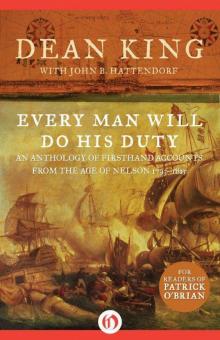Every Man Will Do His Duty Read online
Page 41
At this, I was overcome by grief. I ran below and tried to procure some paper, pen and ink from the members of the crew, offering any price. I was able to offer money, as I had concealed some of my savings by tying the coins in a handkerchief about my neck. The robbers who took my money from my belt did not find this horde. However, no member of the crew durst sell me pen, ink nor paper, as they guessed my intention of writing for aid to escape from a hateful service.
There came along side a boat with stuff to sell. For a shilling, I procured a sheet of paper on which I wrote a letter to the captain of the brig. I desired him to break open my chest and take out my protection and indenture and send them on board as quick as possible. I hired the boat to take this message to him immediately. The message boat made all possible speed; she had a mile and one-half to go, yet she went with such rapidity that in one hour and one-half after, the captain was on board with my indenture and protection.
The lieutenant of the Narcissus said he could do nothing about clearing me, but told the captain of the brig that if he (the captain) would go ashore and see the captain of the frigate, he would direct him where to find him.
There is an island to pass between the spot where we lay on the frigate and the town. It is called Drake’s Island. It was my bad fortune that the captain of the brig carrying my protection and indenture passed on one side of this isle in the message boat, while the captain of the Narcissus passed it on the other side. Therefore they missed each other and my last chance of regaining my liberty was gone. As soon as our captain arrived on the Narcissus, he weighed anchor and put out to sea. I never saw the captain of the brig again.
In this unfortunate manner, I was dragged on board a British man-of-war, August 21, 1809. Despair so complete seized my mind, that I lost all relish for the world. For the first twelve days thereafter, my entire victualing would not have amounted to the one ration as it was allowed us.
I lost, as I left behind me on the brig, more than 50 pounds sterling, a chest full of excellent and well-chosen clothes. Only lately I had quitted the service of the U. States’ after enduring everything. The thought of serving with the British fleet touched every nerve with distress and almost deprived me of reason. I had been eight years from home and I began to despair of ever seeing that place again.
After I had been on board a few days, the captain called me to the quarter deck and asked me if I would enter. He said that if I would, he would give me five pounds.
I utterly refused, telling him I was an American. I also said I would not do duty if I could help it.
“If you will not work I’ll flog you until you’re glad to set about it,” said the captain. “Go below, for I won’t hear another word out of you.”
Below decks, I found twelve more Americans who had been previously impressed. One of them told me that, when he refused to obey an order, the captain had given him four dozen lashes. “Therefore,” said he to me, “I advise you to do as you are bid.”
I thought this excellent advice and I went to work and made myself as contented as possible. I concluded I would write to the American consul when we came to port again.
We voyaged to France and lay to off the port of Nantz. Near us lay the Shannon, on which I was detained a prisoner when they took the American brig as a prize. Some of the Shannon’s crew told me I had better have stayed with them.1
“Our captain is twice as clever as the captain of the Narcissus,” they said.
“Yes,” I replied, “I’d give the devil one if he’d take the other.”
At length, I was noticed by our captain and put in the gig boat. Our allowance for food was so small that I began to lose flesh. One night the gig boat was ordered to go thirty miles from the ship under cover of the darkness, to a place called Horse Island. This lies about four miles from the main land. A great many small boats come out there to pass it by, and our purpose was to capture them.
The island was uninhabited except for five wild horses we saw there. We had only two days provisions with us and, as we stayed there five days, we were forced to shoot one of the horses for food. Neither did we durst make much fire, through fear of being seen from the main land and being surprised and captured. However we made a little fire that just scorched the outside of the meat, which we ate with a great relish, notwithstanding that we had no salt to put on it.
We returned to the frigate after the fifth day on the island. We were not put on duty the morning we returned, which we considered a great favor. The next day again, we were sent off in the same boat, to try if our luck would be better.
This time we took five prizes and brought them to the frigate. They were full of stores and supplies for General Napoleon. They were small craft, called “chamois,” of five to 25 tons burden.
Our captain, considering my forwardness in taking and securing these boats, gave me better usage than I had previously received.2 We lay off Nantz for six months, then returned to Plymouth. At once I wrote to our consul at London, but I have since then been informed that my letters as well as those of other impressed Americans, were intercepted. Even the petitions which the consul made were little noticed and many a sailor brought himself to an untimely end through despair, in consequence of this cruelty and oppression which is called British courage and justice.
We were informed that the French fleet had escaped from Brest. We were ordered to Barbadoes with despatches to inform Admiral [Sir Alexander] Cochrane of their escape.
IN THE WEST INDIES AGAIN AS A BRITISH SAILOR
On our way we captured a French merchantman which was bound for Martinico. These are the particulars of it. Eighteen days out from Brest, early one morning, we espied a sail upon our weather, standing with the wind in her starboard quarter. She was about two leagues distant, with her studding sails set. We gave chase, but since we had the wind directly aft, we hauled our wind on the starboard tack and took in our leeward studding sails.
Soon after we came within gun shot. We gave her a bow shot to the windward, to bring her to, but she still stood on her course. Then we hauled a little to the wind and gave her several shots until at length we shot away her main-top-mast, at which she hove to. When we came within pistol shot, we put out our boat and brought her crew on board. She was a brig, richly laden with cordage and provisions and mounting one 21-pounder.
We put 18 men and a lieutenant on board her and ordered her to the Barbadoes. On the 25th day we arrived there ahead of our prize. We tarried but two hours, having learned that Martinico had surrendered to His Majesty’s forces. We sailed for that port where we found the fleet riding out the bay of Port Royal. We delivered the despatches to the admiral and watered ship.
Next the Narcissus was ordered to cruise to the windward, keeping out a sharp look for the French fleet which had escaped from Brest. On the third day, we discovered a French corvette making in for the island. We kept to the leeward of her for three days sailing, but when another sail came between her and the island, we were able to come within reach of shot.
Upwards of 100 shots were exchanged, before she struck her colors to us. She was a national corvette, mounting 22 guns. We put a prize master on board and sent her to St. Pierre. In the course of 12 days’ cruise, we had but one man killed and we made four prizes.
Then we returned to port to make ready to take part in an expedition against the Saints, a small island lying about five leagues to the westward of Guadaloupe. From thence we were to proceed to Barbadoes to take in troops destined for the operation against the island.
We took transport ships under our convoy. They had 2,000 troops on board them, which force was to make the attack. We were obliged to land the men in flat bottomed boats, under cover of our cannon. We did this in the space of two hours.
One of our light vessels was sent up to keep the fort in play until the land attack could be formed. Our men took two mortar pieces on shore and planted them. While we were busy at this, three French sail of the line and two of their frigates slipped out and escaped us.
Then our land party under General Walter made a noble assault in every part of the island. They resisted us for ten hours then retired to the forts for safety. We kept up the siege for five days.
WOUNDED BY A FRENCH SHOT
I was one of a party which, on the fifth morning, was making a breast works and platform on which we were to plant some more mortars. While working there, an 18-pound shot from them struck the planking next me and a splinter of it broke my leg just below the calf. I was taken to the surgeon’s tent, where a temporary dressing was put on, then was sent to the cock-pit on board the Narcissus, where I underwent a more careful dressing of my hurt.
The following night, the forts surrendered. I never knew the conditions of the surrender. The British lost, in killed and wounded, more than 300 men. The islanders’ loss was said to be more than 700. The wounded were all taken on board and after a common attendance with our own people, were received as prisoners of war.
I was allowed to be confined in a cot as the condition of my leg would not permit me to make use of a hammock. All I could do was to ruminate on the various incidents of my life and there was nothing to prevent these reflections but the pain of my leg. Therefore, like Hamlet, I reasoned with myself. I had been in the service of the British for more than a year and if I continued seven more, I decided I would see my limbs scattered all over the globe and like the wages promised me by the U. States’ service, it would get me nothing material.
“If I kill or am killed,” said I to myself, “who is there to benefit except King George?”
The world’s a stately bark—
On dangerous seas
To be boarded at your peril,
said I, with the poet.
In the meantime, we victualed, watered and got ready for sea in the harbor of Port Royal. Here they had some talk of sending me on shore; but through fear of my escape, they changed their minds and continued me on board.
We cruised for three weeks and made several attacks on a French frigate of superior metal, but as the weather was boisterous, we could not board her. On the last attempt, we were parted by a heavy gale just as the sun went down. In the morning the French frigate had either gone down in the storm or made her escape.
They did us so much damage with their shot between wind and water and with balls which carried a part of our rigging away that we were obliged to go into port to repair the damages.
During this battle, I lay on my cot in an extraordinary uneasyness, wishing to fight rather than to have our colors strike but more because of bravado and pride than because of any self interest in the outcome. But the thought of lying there still while there was so much thunder overhead was, at the same time, insupportable to me. Had not the surgeon’s attendants kept me in, I would have stood at my gun and served it.
However, after the affray was over, when the surgeon examined all the wounded, he found my leg still inflamed. He conceived that all was not right. Therefore he measured and found my injured leg one inch shorter than the other. As a result, I was forced to bear the painful operation of having it broken all over again and newly set. In this condition I was slowly recovering for 60 days before I could be called a “tight sailor” as the saying is, or fit for duty.
Next we were ordered to England, after we had picked up two officers at St. Thomas who were being returned. We arrived in Plymouth July 17, 1810. Here we waited for six or seven weeks for repairs. I was not allowed to go on shore nor to converse with boats that came alongside. I was then put at the business of sail making.
Next we were sent to France to cruise off L’Orient. We found a French brig and schooner lying in Coneall Bay. The brig mounted 14 guns and had 150 men on board. Accordingly, we attempted to cut them out of the bay with our ship’s boats. Five boats and fifty men were selected for this purpose.
We rowed five miles with the tide and came up near the French sail about 8 o’clock in the evening. They hailed us.
“Are you coming to pay us a visit?” they asked,
“Yes,” was our answer and we gave them three cheers.
“Come along, we’re ready,” said they.
Our boats took their station, one on each quarter. The master’s boat was in the center. We attempted to board the brig, but we met with every resistance, as they were fully prewarned against our attack.
As we came along side I attempted to board her by seizing hold of a small cannon whose muzzle protruded through an open port. Finding it impossible to get a footing at this point, I stepped back. I had no sooner done so than she discharged her whole contents at our boat.
Then I attempted to board her by seizing hold of the netting, but I was met by two of their men armed with boarding pikes. I drew a pistol and killed one of them on the spot. I could not reload, as I must keep one hand in the netting, so I killed the other with my second pistol. Then I attempted to board her, sword in hand, but was severely wounded in my leg.
After a while, I grew weak from the loss of blood and fell back into our boat. Two of our boats were destroyed, ten men killed and fifteen wounded. We retreated.
While they were rowing us away, a shot hit the stem of our boat. She took in water very fast and we would all have been drowned there, had not one of the men plugged the hole with the head of a dead man who had been killed at the discharge of the cannon.
With other wounded, I was sent to the hospital at Plymouth, where I was cared for 31 days. I applied for my discharge but it was refused me. My reputation for courage in a fight prevented my being discharged, as it gained me interest from the officers, so that they would not suffer me to go.3
The captain was transferred to another ship and Captain Almyer took command. By his direction, I joined the musicians thinking it easier to play an instrument in the ship’s band than to do ship’s duty. There was a first rate instructor and for three weeks while we chased French privateers, my chief work was blowing on a flute. Gradually I gained some proficiency at it.
The captain now purchased new instruments equal to a full band. I learned the claronet. Even this did not occupy my mind and I longed to return to my own home and my own country. One day, I asked for permission to go ashore. Captain Almyer refused me.
“For,” said he, “you will escape and will be caught and flogged through the fleet.”
Nevertheless, I resolved to escape but the guards were so plenty that I had no chance to put my design into execution. Then the fleet sailed for Spain. There were the frigates Amazon, Dryad, Arathusa and Narcissus. We took on board some Spanish troops whom we carried to St. Antony and landed them there in spite of the French who had possession of the place. However there was later a battle in which the French general was killed with a great many of his men, but for all that, they chased the Spanish troops up into the mountains and forced us back on the ships.
The Amazon, a Spanish frigate and our Narcissus were ordered to Corunna. The wind was ahead, so we put into Vevarrow Bay for the night. The Spanish frigate anchored ahead of us. In the night a great wind arose and she dragged her anchors. Then she drifted on our bow. Our rigging was tangled and her fore-yards, our fore-mast and main-mast all came down on the deck together. Then she dropped astern of us and ran foul of a Spanish brig, whose cable parted. They both ran ashore and only 18 men from their crews of 750 men were saved. This was Nov. 21st, 1811.
On our ship, two men were killed and eighteen injured by the falling of the masts. In the morning, the crew of the Amazon came aboard us to help repair the damage. We worked for four days and then put to sea, to go to Plymouth to refit.
A tremendous storm came up. The wind tore our sails to pieces. With every surf, we expected to go to the bottom, as our stern was shattered by the falling masts. She took in a great deal of water, and for days the wind blew the most violently I have ever experienced in many years service. Through God’s mercy we were spared. So we put into Plymouth dock to repair.
A TRIP ON SHORE AFTER THREE YEARS’ IMPRESSMENT
When a ship unde
rgoes a careful repairing, it is customary to take off her deck, pull her down to the keel and build her up with new timbers. In such a case, it takes three to four months to refit. If the captain has any influence with the Admiralty, he is allowed to retain his hands, instead of recruiting anew. To save them for him, they are sent aboard a hulk for quarters until the ship is again ready for sea. This was the case with us. Our stores, guns and supplies were taken out of the Narcissus, and we went aboard a hulk while they repaired her.
I had now been three years in the service, and I thought it high time to go on shore. I asked the captain for permission, and he said I might, if I would give him my promise not to make my escape. So I went with the musicians who had orders to watch me, although I did not know it at the time. I stayed on shore for 24 hours, enjoying every kind of diversion I thought proper, and then I returned to the hulk.
At that place, ships are built with great expedition. I saw a 74 gun ship launched from the stocks on June 21, 1812 and the same day hauled from her ways into a dry dock. On the 22nd, carpenters were employed coppering her bottom, on the 23rd, she came out of dock and was beside a sheer hulk where she took in her masts and bowsprit. Next she was hauled to the hulk where she was to be rigged. On the 24th, the shrouds were put over her mast-head and the dead eyes turned in, the lower rigging rattled down, fore and aft, her bowsprit shrouds and bob-stays put on, all three top masts pointed through and made ready for swaying away before 12 o’clock. Hands were then piped to dinner and turned up at 1 o’clock. The top masts were swayed, their rigging set up, the fore-castle men rigged, their jib and flying-jib boom after guard, the spanker boom sent up, the fore and main yard and top-sail yards were sent up.

 A Sea of Words
A Sea of Words Skeletons on the Zahara
Skeletons on the Zahara The Feud: The Hatfields and McCoys: The True Story
The Feud: The Hatfields and McCoys: The True Story Every Man Will Do His Duty
Every Man Will Do His Duty 9/11...The Tragic Story of the Day that Changed America: The Terror, The Horror and The Heroes
9/11...The Tragic Story of the Day that Changed America: The Terror, The Horror and The Heroes White Slave Cop
White Slave Cop Skeletons on the Zahara: A True Story of Survival
Skeletons on the Zahara: A True Story of Survival